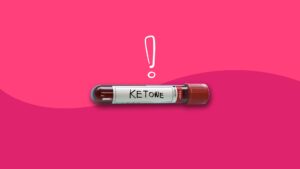The potential of ketones is not just a metabolic byproduct but a powerful tool in treating various health conditions and enhancing overall well-being. Ketones, organic compounds produced by our bodies during the breakdown of fats, have been traditionally associated with low-carbohydrate diets like the ketogenic diet. However, emerging research is uncovering their broader implications in health and medicine, transcending beyond dietary contexts. This blog aims to explore the ketone treatment and lifestyle medications to help.
Contents
When To Seek Ketone Treatment?
 Ketones, by themselves, are a normal and efficient source of energy produced by the body, particularly when carbohydrate intake is low. However, under certain conditions, the presence of high levels of ketones can indicate a health risk that requires medical attention. Here’s when you should consider seeking treatment for ketones:
Ketones, by themselves, are a normal and efficient source of energy produced by the body, particularly when carbohydrate intake is low. However, under certain conditions, the presence of high levels of ketones can indicate a health risk that requires medical attention. Here’s when you should consider seeking treatment for ketones:
- Symptoms of Ketoacidosis
If you’re experiencing symptoms of ketoacidosis, a serious condition where the blood becomes acidic due to high ketone levels, immediate medical attention is necessary. Symptoms include extreme thirst, frequent urination, nausea, vomiting, abdominal pain, weakness, fatigue, shortness of breath, fruity-scented breath, and confusion.
- Type 1 Diabetes
Individuals with type 1 diabetes are at a higher risk of developing diabetic ketoacidosis (DKA). If you have type 1 diabetes and notice high blood sugar levels along with high ketone levels. Especially if you’re ill or stressed, seek medical help promptly.
- Type 2 Diabetes with High Ketone Levels
While less common, people with type 2 diabetes can also develop high ketone levels, especially if they’re undergoing physical stress or have an infection. Regular monitoring and medical consultation are advised if ketones are detected.
- Pregnancy
Pregnant women with diabetes should be vigilant about ketone levels, as ketoacidosis can be harmful to both the mother and the baby. Regular check-ups and immediate medical attention in case of high ketones are crucial.
- Prolonged Fasting or Extreme Diets
If you’re engaging in prolonged fasting or following an extreme diet, like a strict ketogenic diet, and experience symptoms such as nausea, vomiting, or fatigue, it’s advisable to consult a healthcare professional.
- Alcohol Consumption and Eating Disorders
People with a history of heavy alcohol use or eating disorders are at risk of developing ketoacidosis. Medical attention is essential if symptoms of high ketones occur.
Remember, while ketones are a part of normal metabolism, certain situations can turn them into a health hazard. Being aware of these conditions and seeking timely medical treatment is key to maintaining good health.
How Can I Reduce Ketones Naturally?
 Reducing ketones naturally involves a combination of dietary adjustments, hydration, and sometimes changes in your physical activity regimen. This approach is particularly important if you’re managing conditions like diabetes. Here are some strategies to naturally reduce ketone levels:
Reducing ketones naturally involves a combination of dietary adjustments, hydration, and sometimes changes in your physical activity regimen. This approach is particularly important if you’re managing conditions like diabetes. Here are some strategies to naturally reduce ketone levels:
Increase Carbohydrate Intake
Since ketones are produced when your body breaks down fat for energy in the absence of sufficient carbohydrates, increasing your carbohydrate intake can help reduce ketone levels. Include healthy carbohydrates like whole grains, fruits, and vegetables in your diet.
Stay Hydrated
Dehydration can increase ketone levels. Drink plenty of water throughout the day to help flush out excess ketones through urine and to keep your body well-hydrated.
Monitor Blood Sugar Levels
For those with diabetes, keeping blood sugar levels in check is crucial. High blood sugar can lead to increased ketone production. Regular monitoring and maintaining a balance in blood sugar levels can help manage ketone production.
Eat Regular Meals
Skipping meals or fasting can lead to increased ketone production as your body turns to fat stores for energy. Eating regular, balanced meals can help keep ketone levels in check.
Adjust Your Diet
A balanced diet that includes a variety of nutrients can help manage ketone levels. Focus on a diet rich in vegetables, lean proteins, and healthy fats, and moderate in carbohydrates, particularly if you’re on a low-carb diet like keto.
Limit Fat Intake
While dietary fats are essential, excessive intake, especially on a low-carb diet, can lead to higher ketone production. Monitor and potentially reduce your fat intake if your ketone levels are high.
Exercise Moderately
Physical activity can help utilize glucose in your bloodstream and reduce ketone production. However, if your ketone levels are already high, intense exercise might not be safe as it can sometimes increase ketone levels. Opt for moderate activities like walking or gentle cycling.
Avoid Alcohol
Alcohol can interfere with your liver’s ability to produce glucose and increase the risk of hypoglycemia and ketone production. Particularly for people with diabetes.
Manage Stress
Stress can affect your blood sugar levels and subsequently your ketone levels. Engage in stress-reducing activities like yoga, meditation, or deep breathing exercises.
Remember, if you’re trying to manage high ketone levels, particularly if you have a health condition like diabetes, it’s important to work closely with a healthcare provider. They can provide personalized advice and monitor your health to ensure safe and effective management of your condition.
What Are The Medical Approaches In Ketone Treatment?
 High ketone treatment, particularly in the context of diabetic ketoacidosis (DKA) or other ketosis states, primarily involves medical interventions. These approaches are designed to safely lower ketone levels, restore electrolyte balance, and address the underlying causes. Here are the key medical approaches used in treating high ketones:
High ketone treatment, particularly in the context of diabetic ketoacidosis (DKA) or other ketosis states, primarily involves medical interventions. These approaches are designed to safely lower ketone levels, restore electrolyte balance, and address the underlying causes. Here are the key medical approaches used in treating high ketones:
Insulin Therapy
Insulin therapy is vital in managing high ketone levels, especially in cases of diabetic ketoacidosis (DKA). When ketone levels are elevated, it’s often due to a lack of insulin, which is essential for glucose uptake into cells. By administering insulin, either through injections or an intravenous drip in a hospital setting, healthcare providers can rapidly decrease blood glucose levels, thereby reducing the production of ketones. Insulin therapy must be carefully monitored to avoid hypoglycemia, a condition where blood sugar levels drop too low.
Fluid Replacement
High levels of ketones can lead to dehydration, primarily because of increased urination as the body attempts to eliminate excess sugar and ketones. Rehydration is a critical step in treatment. This often involves administering saline intravenously, especially if the patient is unable to consume sufficient fluids orally. The rate and amount of fluid replacement depend on the individual’s level of dehydration and their overall health status.
Electrolyte Replacement
The imbalance of ketones affects the electrolyte balance in the body. Key electrolytes like potassium, sodium, and bicarbonate may be depleted. Restoring these electrolytes is crucial to prevent complications such as cardiac arrhythmias or muscle weakness. This is typically achieved through intravenous supplementation, and the specific electrolytes administered are tailored to the patient’s needs, as determined by regular blood tests.
Treatment of Underlying Causes
Simply treating the symptoms of high ketones is not enough; addressing the root cause is essential for complete management. In diabetics, this might involve adjusting insulin therapy or medication. In other cases, treating infections, managing stress, or correcting dietary imbalances may be necessary. Understanding and tackling these underlying factors helps prevent the recurrence of elevated ketone levels.
Patient Education
Educating patients, especially those with conditions like diabetes, is an integral part of treatment. Understanding how to manage their condition, recognizing early signs of complications like ketoacidosis, and the importance of regular monitoring empowers patients to take an active role in their health management. This education can include advice on diet, exercise, medication adherence, and how to use home monitoring equipment.
These medical approaches to ketone treatment highlight the importance of a comprehensive and individualized treatment plan, overseen by healthcare professionals, to effectively manage and mitigate the risks associated with high ketone levels.
Conclusion
In conclusion, ketone treatment is a critical aspect of maintaining good health, especially for individuals with conditions like diabetes. From the essential role of insulin therapy in regulating blood sugar and ketone levels to the importance of fluid and electrolyte replacement, each aspect of treatment plays a vital role in ensuring safety and recovery. Moreover, understanding the underlying causes, continuous monitoring, and long-term management form the pillars of effective ketone management.
It’s clear that a comprehensive, individualized approach, guided by healthcare professionals, is key to successfully managing ketone levels and preventing the associated health risks. Do you want to get rid of diabetes? Join our online diabetes treatment program and reverse Diabetes naturally through lifestyle changes such as a Personalized Diet plan, Exercise, Yoga, dieticians, and health coaches.

